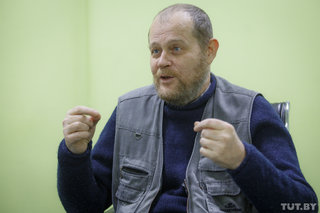
Belarus Sitting on the Splits: As Uncomfortable as It Seems?
Publication: Eurasia Daily Monitor Volume: 12 Issue: 134
By:

In his interview to Euroradio, the charge d’affaires of the European Union’s delegation in Belarus, Richard Rudolph, underlined the gradual improvement in the relationship between the EU and Belarus. But he also made the following observation regarding Belarus’s willingness to have good relations with both the East and the West: “It is good to be at a crossroads,” said Rudolph, “but sometimes it is uncomfortable to sit on the splits for too long” (Euroradio, May 28). Arguably, at least one of the critical reasons for the current crisis in Ukraine—a country that shares the same geopolitical niche with Belarus (i.e., between Russia and the EU)—has been the zero-sum game approach practiced by both Russia and the collective West as well as a lack of immunity to that sort of treatment on the side of the Ukrainian political class. Therefore, “sitting on the splits,” however uncomfortable it may be, could still be preferable to separatism, outright war, destruction, and a sizable death toll. In this light, it is Rudolph’s remark itself that may actually be uncomfortable—or even misleading.
This may be especially so considering that Minsk’s official position on the crisis in Ukraine is more even-handed than that of Belarusian public opinion (see EDM, July 8), as highlighted by polling data, including the June survey by the Independent Institute for Socio-Economic and Political Studies (IISEPS). According to that poll, 39 percent of Belarusians have a favorable attitude to the concept of the “Russian world”; the attitude of 15 percent is negative; and 39 percent profess indifference. But while the core of the “Russian world” is Russia itself as well as, allegedly, Belarus and Ukraine, Sergei Nikolyuk of IISEPS pays attention to the contrasts in what he calls the civic maturity of these communities. The constitutions of all three Eastern Slavic countries define “the people” as the sole source of state power and the purveyor of national sovereignty. However, the 2014 responses to the question “Who is the purveyor [nositel] of sovereignty and authority?” revealed that in Russia, 55 percent are of the opinion that their president is and only 23 percent reaffirmed what the constitution says (i.e., the people); in Ukraine, the corresponding ratio was 26 percent to 57 percent; whereas Belarus is in between—49 percent versus 45 percent. And at the same time, most Belarusians believe they live in a democratic country (Naviny.by, July 9).
Considering this supposedly immature attitude to the major underpinning of authority and power in a democratic society, Yury Drakakhrust of Radio Liberty and Tut.by invoked the famous dictum of Russia’s greatest poet, Alexander Pushkin, who once wrote that “our government is the sole European” in the country. That is, Drakakhrust argued that the Belarusian government could actually be much “worse” (and scarcely “better”) given the dominant attitudes and mores among the general population. Still, he discerned some principal differences between public opinion in Russia and Belarus. Whereas in Russia there is a deep-seated imperial tradition, in Belarus this is not quite so. Yes, Belarusians are rather tolerant of the “Russian world” concept, feel that Crimea rightfully belongs to Russia, and revere Vladimir Putin. But only 60 percent of Belarusians support Putin, not 89 percent, as in Russia (according to Levada Center). Moreover, most Belarusians (76.9 percent) have a negative attitude toward participating on either side of the Ukrainian conflict; likewise; most Belarusians (64.8 percent) do not want Belarus to join Russia’s retaliatory sanctions imposed on the EU; quite a few Belarusians (45.1 percent) also do not want a Russian airbase in Belarus, whereas only 22.4 percent do; and as many as 74.8 percent of Belarusians believe Belarus should not allow Russia to use Belarusian territory to launch a major military operation against Ukraine (Tut.by, July 6). Definitely, then, despite a genuine closeness to Russia, Belarus reveals plenty of signs of being a different cultural entity.
Apparently, Belarus’s sizable Catholic minority is one of the sources for this aforementioned difference. Notably, on July 4, as many as 2,897 pilgrims came on foot to Budslav (in Myadzel rayon of Minsk Oblast) to participate in a major celebration devoted to the Icon of the Mother of God, exhibited in the major Catholic cathedral located in that small town (Tut.by, July 4). So when a Russian social design center administrator expresses concern that many Belarusian youths bear tattoos depicting Lithuanian knights and containing Slavic words written in Latin script, he may be on target (Lenta.ru, July 1). Culturally, Belarus is no Russia, while it is not integral to the collective West either.
According to some influential pundits, this has also been characteristic of Greece (Walls Street Journal, June 30), which was purportedly incorporated into Western structures for purely geopolitical reasons, and based on these same reasons it should now be rescued. Likewise, it is probably futile to demand too much in terms of democratic standards and profound economic reform from Minsk because denying much-needed aid to Belarus would only push this Eastern European country even deeper into the embraces of Russia. Just as fresh signs appeared that the International Monetary Fund (IMF) may agree to restart a loan program for Belarus, Minsk asked the EU for a $3 billion loan (Zautra Tvayoi Krainy, July 7). In this regard, it is probably counterproductive to draw a parallel between Belarus and Greece on the grounds that both have an insatiable appetite for loans and live beyond their means.
Alexander Klaskovsky, a veteran opposition journalist, claims that the similarity between the two recipients of loans is not so much in the size of those loans or in their dynamics; rather, it is in the fact that money is going to be wasted in both cases (Naviny.by, July 8). However, this is not a certainty, at least with regard to Belarus. Furthermore, the magnitude of Greece’s and Belarus’s needed aid sets the two countries apart most eloquently. If the past dynamics of loan repayment and economic growth is any guide for the future, Belarus is no basket case (see EDM, March 18, April 7). And “sitting on the splits” may be its best achievable position for the foreseeable future.




